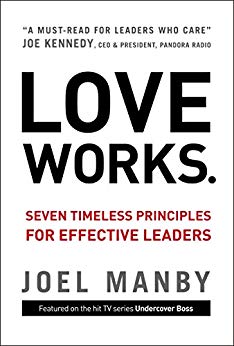
As you may suspect from the title, the big idea in the book “Love Works” is about leading an organization based on love. Joel Manby spent the first half of his career in the automotive business, in companies where leadership was based on the command and control model. But when he became the president and CEO of Herschend Family Entertainment, he found a whole different culture built upon the mantra of “Leading with Love,” which guides the way the company treats employees and customers. This book is all about servant leadership, even though that phrase only shows up once in the book, and then only in a graphic about HFE’s culture.
The idea of love is easily misunderstood in today’s modern, American culture. In the second chapter the author talks of the four different Greek words for love – eros, philos, storge, and agape. For sure, when we speak of love in leadership, we are not speaking of the emotion of love, which would describe the first of those three Greek words. The word that guides leadership is agape, the love that is an action which stems from our regard for the other person and seeks the best for them.
Manby then describes HFE’s model of leadership based on seven principles that are paraphrased from 1 Corinthians 13, the “love chapter” in the Bible, which is used so often in marriage ceremonies. The words that he uses are “Love is … patient, kind, trusting, unselfish, truthful, forgiving, and dedicated.”
- Patient– have control in difficult situations. Here the author speaks mainly of patience in the feedback process. The advice is not to be patient with poor performance but, rather, to be patient with how you respond to that poor performance. Praise more than you admonish and praise in public, admonish in private.
- Kind– show enthusiasm and encouragement. The customer’s experience is impacted greatly by the attitudes of employees, so extending kindness and demonstrating enthusiasm to your team results in kindness and enthusiasm shown to your customers. Provide words and notes of recognition and appreciation to encourage and validate positive behaviors.
- Trusting– place confidence in others. The author speaks here of the decision-making process and the need to get input and keep the appropriate people informed. This includes delegating and listening. He states, “Listening carefully is a sign of trust. Interrupting people is a sign of distrust.”
- Unselfish– thinking of yourself less and focusing on others. Here he speaks of giving of your time, talent, and treasure to help others and describes many ways to do so. The HFE organization has an employee-funded foundation to help fellow employees through difficult circumstances.
- Truthful– define reality corporately and individually. Honesty is always the best policy. The author describes the need for candor in all discussions and the importance of also being open to the truth as a leader.
- Forgiving– release the grip of the grudge. Manby states, “The longer you hold a grudge, the longer the grudge has a hold on you.” He urges leaders to forgive people who have wronged the organization as well as people who have wronged us personally.
- Dedicated– stick to your values in all circumstances. This is the concept that we have termed as integrity or as congruity, the idea that our values are firmly rooted and guide us unswervingly.
For sure, every company needs to have financial goals. Leaders are stewards of the organization and profitability is how we assure that the organization survives and thrives in its mission of serving customers and employees. But Manby and the HFE organization makes a strong case that being a good financial steward and the culture of “leading with love” fit hand in glove in achieving true success.

Add your comment